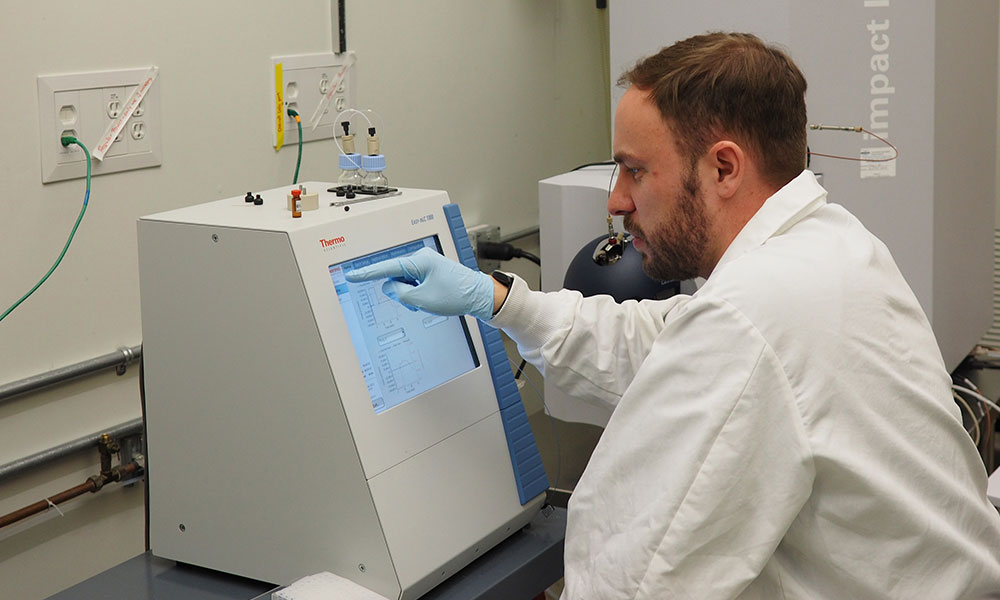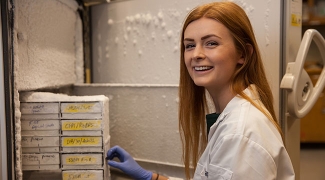Our partnership with the Centre for Blood Research (CBR) at the University of British Columbia is helping to train the next generation of researchers in transfusion science. This blog post highlights just some of the achievements in education, training or knowledge mobilization accomplished by CBR trainees.
Dr. Peter Bell, a research associate in Dr. Christopher Overall’s laboratory at the Centre for Blood Research, received second prize in Canadian Blood Services’ Research 180 Video Competition earlier in 2023 for an original video showcasing his research. In the blog below, Peter reflects on the video, titled “Styling proteins with nano-sized scissors: A matter of life and death”, and the experience of creating it.
What drew you to enter the Research 180 Video Competition?
I have a long-standing interest in audio-visual production, and I’ve co-produced some short science communication videos in the past for other researchers. I saw the Research 180 Video Competition as a challenge to get in front of the camera myself for the first time, and an opportunity to communicate the research of our lab to the public. I heard about the competition from Dr. Parvin Bolourani, our education program manager in Vancouver, who does a great job of co-ordinating and communicating training opportunities at the Centre for Blood Research (CBR).
How would you describe the goal of your research? What do you hope to accomplish with your research in the future?
The goal of my research is to better understand the impact that ‘proteolysis’ (the cleavage of one protein by another protein) has in health and disease. In recent years, our lab has applied our skills to explore the role of proteolysis in SARS-CoV-2 infection. In the future, I hope to apply similar methods to explore the impact of proteolysis in genetic disease and its relevance to the development of new biologic drugs. Ultimately, I’d like to contribute to new therapies that treat disease.

What does a typical day in the lab look like for you?
My role is pretty varied – some days I’ll be conducting experiments in the lab, others I’ll be focused on analysis and interpretation of the experimental data or writing manuscripts that communicate the results to other scientists. Another efficient way to make new discoveries is to re-analyse publicly available data generated by other labs; so increasingly, I’ve been dedicating more time to this way of conducting research and working from a computer.
What is the biggest challenge you experience with your research?
I’m fortunate to be able to work on many different projects that cover very different research domains. All of these projects have the potential to yield impactful discoveries, but the challenge is in identifying the lines of enquiry which are most likely to do so most efficiently. The key to managing this challenge is collaboration with other scientists – none of us can be experts in every discipline, so the collective pace of research can move more rapidly if we identify our strengths and offer our support to other researchers.
What is the most exciting thing you’ve learned during your research in the Overall lab?
I’m most excited by new developments in computational biology, which can generate hypotheses and present opportunities for research that until recently would have been considered science-fiction. During my research in the Overall lab, I’ve learned how to use and develop some of these tools to make predictions of biological processes, and how to analyse and integrate experimental data from different sources to yield new insights!
-
For details of past lay science writing and Research 180 video competitions, including stories from other researchers, search “lay science writing competition” on Canadian Blood Services’ R.E.D. blog.

Canadian Blood Services – Driving world-class innovation
Through discovery, development and applied research, Canadian Blood Services drives world-class innovation in blood transfusion, cellular therapy and transplantation—bringing clarity and insight to an increasingly complex healthcare future. Our dedicated research team and extended network of partners engage in exploratory and applied research to create new knowledge, inform and enhance best practices, contribute to the development of new services and technologies, and build capacity through training and collaboration. Find out more about our research impact.
The opinions reflected in this post are those of the author and do not necessarily reflect the opinions of Canadian Blood Services nor do they reflect the views of Health Canada or any other funding agency.
Related blog posts
Announcing the winning entries from the Canadian Blood Services Research 180 Video Competition showcasing “Impact in motion”!
Canadian Blood Services, in partnership with the Centre for Blood Research, just launched our first ever Research 180 Video Competition for trainees. Read on to learn more!
A PhD candidate with the Centre for Blood Research at the University of British Columbia is conducting a study to research where the differences in blood from donor to donor come from and how that information can be used to support better patient outcomes.


